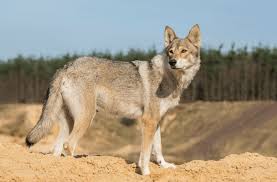
Tamaskan Dog
Conditions of detention
Tamaskan Dogs are versatile and can adapt to various living conditions, but they thrive in environments where they have plenty of space to run and play. They are well-suited for homes with large yards or rural settings.
Useful Fact: Tamaskans require a significant amount of exercise, making them ideal for active families or individuals who enjoy outdoor activities.
Nutrition and diet
Tamaskans benefit from a high-quality, balanced diet that includes a good mix of proteins, fats, and carbohydrates. Their diet should be tailored to their age, size, and activity level.
Useful Fact: Feeding them a diet that includes raw or high-quality commercial dog food can help maintain their health and energy levels.
Health
Tamaskan Dogs are generally healthy, but they can be prone to certain genetic conditions such as hip dysplasia and epilepsy. Regular veterinary check-ups are essential to monitor their health.
Useful Fact: Responsible breeding practices and health testing can significantly reduce the risk of hereditary conditions in Tamaskans.
Grooming and care
Tamaskans have a dense double coat that requires regular brushing to remove loose hair and prevent matting. They shed heavily, especially during seasonal changes.
Useful Fact: Regular grooming sessions help keep their coat healthy and can also be a bonding activity between the dog and the owner.
Education and training
Tamaskans are intelligent and eager to please, making them relatively easy to train. They respond well to positive reinforcement and consistency.
Useful Fact: Early socialization and obedience training are crucial to ensure they develop into well-mannered adults.
Toys and entertainment
Tamaskans enjoy toys that challenge them mentally and physically. Interactive toys, fetch toys, and agility equipment are great options to keep them engaged.
Useful Fact: Providing a variety of toys and regular playtime can help prevent boredom and destructive behavior.
Safety
Due to their high energy and curiosity, Tamaskans should be kept on a leash or in a secure area when outdoors to prevent them from wandering off.
Useful Fact: A well-fenced yard is ideal for giving them space to play safely without the risk of escaping.
Accessories
Sturdy collars, harnesses, and leashes are important for Tamaskans, especially during training and outdoor activities.
Useful Fact: Using a harness can provide better control and prevent neck strain during walks and runs.
Socialization
Tamaskans are social dogs that enjoy the company of people and other animals. Early and consistent socialization is important to ensure they are comfortable in various environments.
Useful Fact: Exposing them to different people, places, and experiences from a young age helps them become confident and well-adjusted adults.
Travel and Transportation
Tamaskans can travel well if they are accustomed to it from a young age. Ensuring they have a comfortable and secure space in the vehicle is important.
Useful Fact: Using a travel crate or a harness designed for car travel ensures their safety and comfort during trips.
Behavior and psychology
Tamaskans are known for their friendly and gentle nature. They are intelligent, loyal, and have a strong pack mentality, making them excellent family pets.
Useful Fact: Understanding their need for social interaction and providing regular companionship can help prevent separation anxiety and other behavioral issues.
Legal aspects
Owners should comply with general dog ownership laws, such as licensing, vaccination requirements, and leash laws.
Useful Fact: In some areas, there may be specific regulations regarding wolf-like breeds, so checking local laws is important.


